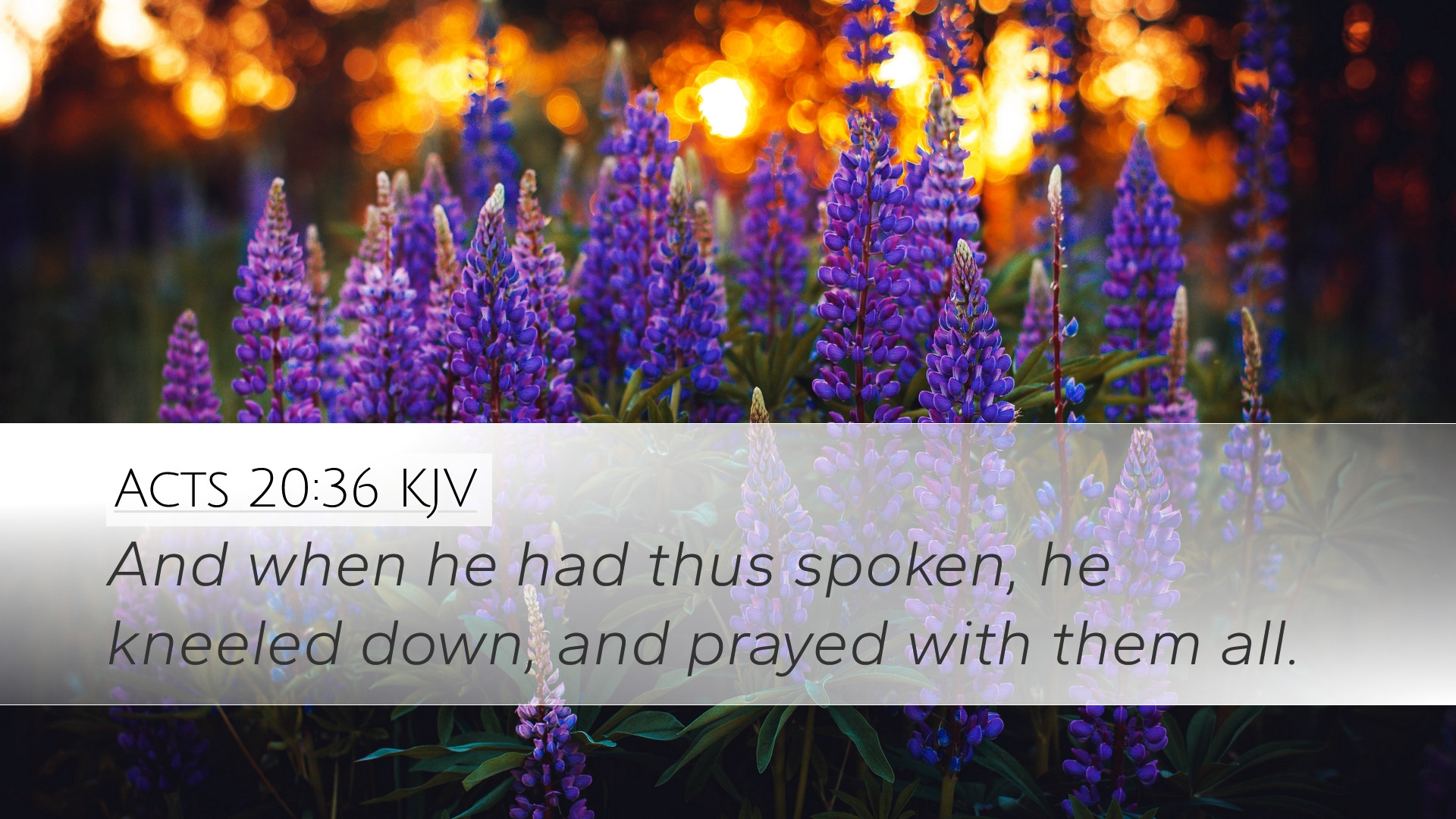Commentary on Acts 20:36
Acts 20:36 states, "And when he had said these things, he knelt down and prayed with them all." This poignant moment captures the profound emotional and spiritual connection between the Apostle Paul and the elders of the church at Ephesus.
Summary of Context
This verse occurs at the conclusion of Paul's farewell address to the Ephesian church leaders. After a lengthy discourse imparting wisdom, encouragement, and warnings, Paul demonstrates the power of prayer and its significance in Christian fellowship.
Insights from Public Domain Commentaries
Matthew Henry's Commentary
Matthew Henry emphasizes the communal aspect of prayer, noting that Paul's act of kneeling is a gesture of humility and reverence before God. He states, "The posture of prayer is important; kneeling shows submission to God and seriousness in seeking His favor." This act of kneeling with the elders signifies a deep bond formed around the shared mission of spreading the gospel.
Henry further notes that prayer is a vital component of Christian leadership, as Paul entrusts the Ephesians to God, recognizing that the challenges they will face require divine guidance. His humility in approaching God with the church leaders highlights the necessity of collective prayer in sustaining church life.
Albert Barnes' Notes on the Bible
Albert Barnes provides a detailed analysis of the implications of this prayer scene, indicating that Paul's physical action of kneeling reflects the significance of prayer, especially in moments of departure and loss. He elaborates, "This kneeling was a sign of reverence and supplication. It expressed the deep sense of need that both Paul and the Ephesians felt as they faced an uncertain future."
Barnes points out that this moment serves as a model for all Christian leaders, exemplifying the need to rely on God in their ministries. He aligns Paul's farewell with the reality of pastoral care, urging leaders to remain devoted to prayer for their congregations.
Adam Clarke's Commentary
Adam Clarke highlights the emotional weight of this moment, noting that Paul's farewell was marked by tears and heartfelt expressions of affection, culminating in this fervent prayer. He asserts, "This was not a mere ceremonial prayer but a heartfelt plea for the guidance and protection of God over the Ephesians."
Clarke's observations draw attention to the passionate connection between Paul and the elders, underscoring that true leadership in the church involves deep relational ties that foster a spiritual community. He urges modern-day leaders to cultivate such bonds within their ministries.
Theological Reflections
- The Role of Prayer: Acts 20:36 underscores the centrality of prayer in the life of the church. It is a reminder of the dependence on God for every aspect of ministry and spiritual growth.
- Clarity of Mission: Paul's prayers reflect a clear focus on the mission of the church. He exhorts the leaders to remain vigilant and faithful, which serves as a timeless call to all church leaders today.
- Community in Leadership: This passage invites leaders to recognize their collective accountability and mutual support within their spiritual communities. The authentic relationships built through prayer enhance the church’s unity.
Conclusion
Acts 20:36 serves as a profound testament to the power of prayer and the deep relational ties that ought to exist among Christian leaders. Drawing from the insights of renowned commentators like Matthew Henry, Albert Barnes, and Adam Clarke, we see that this moment is both a farewell and a celebration of the spiritual bond among believers, firmly rooted in prayer.
For pastors, students, and theologians alike, this passage is not merely historical; it offers enduring lessons on the necessities of humility, dependence on God, and the profound impact of prayer within the church's leadership.


